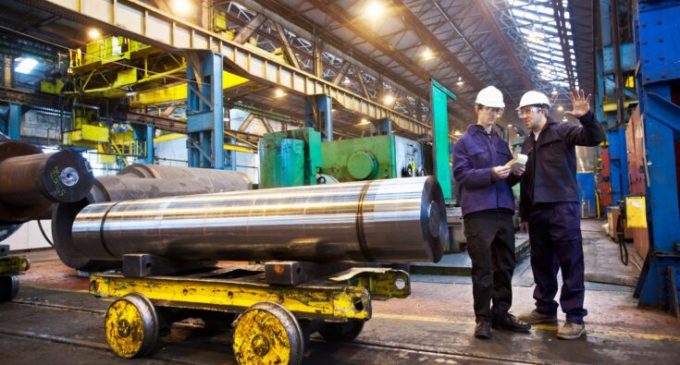Improving resource and energy efficiency in the UK’s foundation industries

15 innovative new projects have been announced to improve resource and energy efficiency in UK’s foundation industry companies and supply chains. These projects have secured funding of £1.2 million from the transforming foundation industries challenge.
They will focus on resource or energy efficiency in the foundation industries or their immediate supply chains. This will help companies to adapt and prosper in response to their customer’s increasing demands for more sustainable products.
Competition delivery
The competition, delivered by Innovate UK, ran in two strands with the aim to improve the competitiveness of the foundation industry sector by helping it to become more environmentally sustainable.
Strand one of the competition aimed at smaller companies who had realised that they needed to develop new technology, but who may not have previously considered applying for Innovate UK support. In this category, 12 companies have been awarded grants for projects of up to £75,000.
In addition, three applicants to strand two have been awarded grants for projects of up to £250,000 to undertake larger collaborative cross-sector innovation projects. Some of the projects being funded are exploring incremental improvements in product or process design. However, others could just be the beginning of something bigger, innovative or that challenges the status quo.
Support from the knowledge transfer network (KTN)
Jafar Daji, Technical Manager, Parkinson-Spencer Refractories Ltd, said: “Parkinson-Spencer’s Refractories production is energy intensive so faces many challenges that are common across the foundation industries. As part of our business strategy, we see the need to support the decarbonisation of the industry, which is why we welcome the support of Innovate UK for companies like ours.
“We found the support of the KTN in giving feedback on this our first application, extremely helpful. They not only asked the right questions to make sure that we fully addressed the questions on the application form, but also shared their experience in creating a realistic research plan.”
Pioneering companies
Bruce Adderley, Challenge Director, transforming foundation industries, said: “We’ve been very pleasantly surprised by the ambition of what these pioneering companies are hoping to achieve, and by the sheer variety of solutions that there are for making the materials that don’t pollute the planet. Unless our foundation industries can produce the basic materials more sustainably, then there’s little chance that our economy that is built on these materials can make the changes that it needs to.”
For further information on how the transforming foundation industries challenge can help your company to prosper through addressing the opportunities of the UK’s 2050 zero net carbon target, please contact the KTN.
The transforming foundation industries challenge
The transforming foundation industries programme is supported by UK Research and Innovation’s Industrial Strategy Challenge Fund (ISCF) and delivered by Innovate UK. It will help energy-intensive businesses to share expertise and come up with radical new innovations to help reduce their carbon footprint.
The programme will inject significant new public and industry innovation funding into the foundation industries, helping us deliver against our vision of a cutting edge, innovative and sustainable industrial sector. £66 million will be provided by the government and £83 million will come from industry.
ISCF brings together the UK’s world-leading research base with our best businesses to transform how we live, work and move around. It will put the UK in the best position to take advantage of future market opportunities.
Competition winners
Development of a chipboard substitute made from seaweed and paper waste
Lead: Algreen Ltd
Location: London
Project duration: 10 months
The manufacture of low cement concrete from steel sector slag
Lead: Material Evolution Ltd
Location: Middlesbrough
£47,850 grant, £68,357 project cost.
Project duration: six months
Non-cement based concrete for pre-cast conrete products
Lead: ARC Marine Ltd
Location: Brixham
£52,300 grant, £74,715 project cost.
Project duration: six months
Oxidative Ionothermal synthesis for the low energy valorisation of metal wastes
Lead: Nanomox Ltd
Location: London
£48,856 grant, £69,794 project cost.
Project duration: 12 months
Lightweighting kiln furniture to reduce parasitic heating loss
Lead: Almath Crucibles Ltd
Location: Newmarket
£56,829 grant, £74,765 project cost.
Project duration: 12 months
Development of non-contact sensors for the detection of temperature and chemical composition of molten materials
Lead: Pyroptik Instruments Ltd
Location: Sheffield
£59,212 grant, £74,962 project cost.
Project duration: nine months
Enzymes for the creation of chemical feedstock from waste plastics
Lead: Scindo Ltd
Location: London
£52,241 grant, £74,630 project cost.
Project duration: 12 months
Power generation using a turbine to reduce the pressure of an industrial gas supply
Lead: C2 Technology UK Ltd
Location: London
£48,488 grant, £69,269 project cost.
Project duration: nine months
Remote monitoring of concrete condition
Lead: Lateral Logic Limited
Location: Lincoln
£57,826 grant, £74,903 project cost.
Project duration: nine months
Two layer coatings for compostable repulpable paper
Lead: Scitech Adhesive Systems Limited
Location: Flint
£59,250 grant, £75,000 project cost.
Project duration: six months
The use of induction heating for lower energy diffusion coating
Lead: Diffusion Alloys (UK) Limited
Location: Middlesbrough
£51,503 grant, £73,576 project cost.
Project duration: eight months
Energy efficient, low carbon dioxide refractories for the foundation industries
Lead: Parkinson-Spencer Refractories Limited
Location: Halifax
£53,663 grant, £74,687 project cost.
Project duration: 12 months
Innovative 3D printing of silicon carbide parts
Lead: Photocentric Limited
Location: Peterborough
£175,908 grant, £246,661 project cost.
Project duration: 10 months
Development of low carbon innovative composite material for the construction industry
Lead: Kenoteq Ltd
Location: Edinburgh
£197,450 grant, £249,951 project cost.
Project duration: 12 months
Using graphene to increase the strength of concrete
Lead: First Graphene (UK) Limited
Location: Manchester
£190,034 grant, £240,865 project cost.
Project duration: 12 months
Image: Credit: Leon Harris, Image Source via Getty Images


























